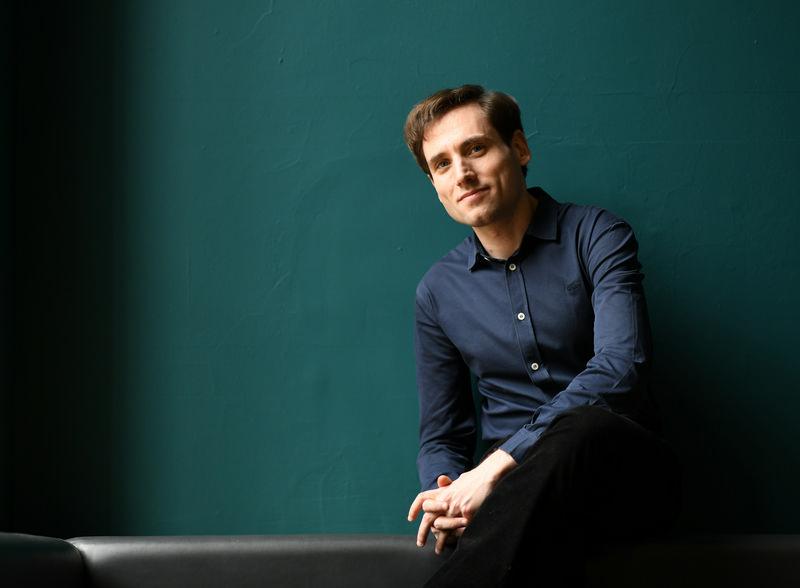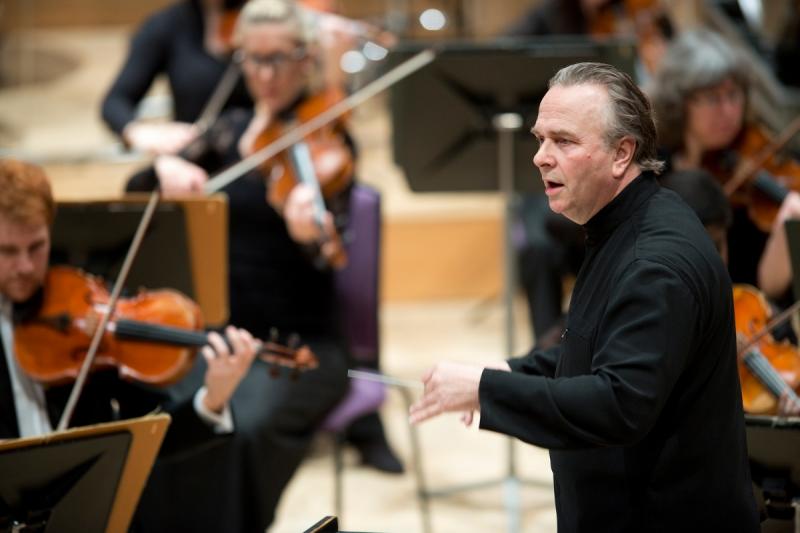Giltburg, Hallé, Elder, Bridgewater Hall, Manchester review - back to glorious normal? | reviews, news & interviews
Giltburg, Hallé, Elder, Bridgewater Hall, Manchester review - back to glorious normal?
Giltburg, Hallé, Elder, Bridgewater Hall, Manchester review - back to glorious normal?
Adventure and attractiveness in plenty with a master of Rachmaninov

Boris Giltburg, the soloist in Rachmaninov’s Fourth Piano Concerto, was for elbow-bumping as he greeted the leader of the night, Jan Schmolck, but Elder seized him and others by the hand to share his enthusiasm. So was this, at last, the “back to normal” Hallé concert? Only time will tell.
It certainly was, to listen to. Elder (pictured below by Russell Hart) began with Josef Suk’s Fantastic Scherzo, a lively and beguiling piece, bringing to it a suitably big dynamic palette and clearly exposing its counter-melodies and orchestral detail. The first violins were elegant in high register in the time-changed trio section and precise in their pizzicati, and the divided cello choir were beautiful to hear in their moment of quiet glory.
Then the main event. Boris Giltburg has become a recognized master of Rachmaninov’s piano music and much in demand for it. The Fourth Concerto, though, is one that’s rarely heard. Why so? It has the nervy, insecure atmosphere of much music from the 1920s, and though all the old tricks are there it conspicuously lacks the long, uncurling melodies we think of as typically Rachmaninov. The slow movement lingers for some time on a brief theme which was identified from the start as having too much resemblance to the first phrase of “Three Blind Mice”.  There are constant moments of repose amid the pianistic fireworks, though, more characterized by nostalgia and melancholy than any heavenly yearning, and both soloist and conductor alighted on each one with charm and affection. Giltburg has the firepower to dazzle in all the technical acrobatics and at the same time a touch that glows in its cantabile and an approach that takes the music’s meditative side in full measure. The finale was extremely lively, and wind solos from the orchestra (Laurence Rogers’ horn in particular) matched Giltburg for purity and romance.
There are constant moments of repose amid the pianistic fireworks, though, more characterized by nostalgia and melancholy than any heavenly yearning, and both soloist and conductor alighted on each one with charm and affection. Giltburg has the firepower to dazzle in all the technical acrobatics and at the same time a touch that glows in its cantabile and an approach that takes the music’s meditative side in full measure. The finale was extremely lively, and wind solos from the orchestra (Laurence Rogers’ horn in particular) matched Giltburg for purity and romance.
After the interval it was off to Mickey Mouse land for Dukas’ The Sorcerer’s Apprentice (incidentally, in one of the interesting little connections woven through this programme, a piece Fantasia fans will have heard as conducted by Leopold Stokowski on the film soundtrack – the same Stokowski who premiered and recorded the Rachmaninov concerto with its composer).
This had all the vivid, storytelling quality we expect from this conductor and this orchestra, but it was just a warm-up for Janáček’s Sinfonietta, which has become almost a calling-card for Sir Mark and the Hallé. If they can muster a full-size orchestra and an extra 13 brass players to volley its fanfares over them into the vast space of the Bridgewater Hall, then everything must be back to normal, mustn’t it?
The piece, contemporary with the Rachmaninov concerto but a million miles from it in spirit, has buckets of rhythmic drive (which the concerto rather lacks), and Sir Mark loves its energy and sonic colours. The Hallé brass and wind were on their mettle, playing with heavenly sound in the slow movement and confidence and power in the scherzo-style one that follows. The conclusion, with returning fanfares, was completed in aptly stentorian manner.
rating
Explore topics
Share this article
The future of Arts Journalism
You can stop theartsdesk.com closing!
We urgently need financing to survive. Our fundraising drive has thus far raised £49,000 but we need to reach £100,000 or we will be forced to close. Please contribute here: https://gofund.me/c3f6033d
And if you can forward this information to anyone who might assist, we’d be grateful.

Subscribe to theartsdesk.com
Thank you for continuing to read our work on theartsdesk.com. For unlimited access to every article in its entirety, including our archive of more than 15,000 pieces, we're asking for £5 per month or £40 per year. We feel it's a very good deal, and hope you do too.
To take a subscription now simply click here.
And if you're looking for that extra gift for a friend or family member, why not treat them to a theartsdesk.com gift subscription?
more Classical music
 BBC Proms: The Marriage of Figaro, Glyndebourne Festival review - merriment and menace
Strong Proms transfer for a robust and affecting show
BBC Proms: The Marriage of Figaro, Glyndebourne Festival review - merriment and menace
Strong Proms transfer for a robust and affecting show
 BBC Proms: Faust, Gewandhausorchester Leipzig, Nelsons review - grace, then grandeur
A great fiddler lightens a dense orchestral palette
BBC Proms: Faust, Gewandhausorchester Leipzig, Nelsons review - grace, then grandeur
A great fiddler lightens a dense orchestral palette
 BBC Proms: Jansen, Royal Concertgebouw Orchestra, Mäkelä review - confirming a phenomenon
Second Prom of a great orchestra and chief conductor in waiting never puts a foot wrong
BBC Proms: Jansen, Royal Concertgebouw Orchestra, Mäkelä review - confirming a phenomenon
Second Prom of a great orchestra and chief conductor in waiting never puts a foot wrong
 BBC Proms: Royal Concertgebouw Orchestra, Mäkelä review - defiantly introverted Mahler 5 gives food for thought
Chief Conductor in Waiting has supple, nuanced chemistry with a great orchestra
BBC Proms: Royal Concertgebouw Orchestra, Mäkelä review - defiantly introverted Mahler 5 gives food for thought
Chief Conductor in Waiting has supple, nuanced chemistry with a great orchestra
 Dunedin Consort, Butt / D’Angelo, Muñoz, Edinburgh International Festival 2025 review - tedious Handel, directionless song recital
Ho-hum 'comic' cantata, and a song recital needing more than a beautiful voice
Dunedin Consort, Butt / D’Angelo, Muñoz, Edinburgh International Festival 2025 review - tedious Handel, directionless song recital
Ho-hum 'comic' cantata, and a song recital needing more than a beautiful voice
 Classical CDs: Dungeons, microtones and psychic distress
This year's big anniversary celebrated with a pair of boxes, plus clarinets, pianos and sacred music
Classical CDs: Dungeons, microtones and psychic distress
This year's big anniversary celebrated with a pair of boxes, plus clarinets, pianos and sacred music
 BBC Proms: Liu, Philharmonia, Rouvali review - fine-tuned Tchaikovsky epic
Sounds perfectly finessed in a colourful cornucopia
BBC Proms: Liu, Philharmonia, Rouvali review - fine-tuned Tchaikovsky epic
Sounds perfectly finessed in a colourful cornucopia
 BBC Proms: Suor Angelica, LSO, Pappano review - earthly passion, heavenly grief
A Sister to remember blesses Puccini's convent tragedy
BBC Proms: Suor Angelica, LSO, Pappano review - earthly passion, heavenly grief
A Sister to remember blesses Puccini's convent tragedy
 BBC Proms: A Mass of Life, BBCSO, Elder review - a subtle guide to Delius's Nietzschean masterpiece
Mark Elder held back from blasting the audience with a wall of sound
BBC Proms: A Mass of Life, BBCSO, Elder review - a subtle guide to Delius's Nietzschean masterpiece
Mark Elder held back from blasting the audience with a wall of sound
 BBC Proms: Le Concert Spirituel, Niquet review - super-sized polyphonic rarities
Monumental works don't quite make for monumental sounds in the Royal Albert Hall
BBC Proms: Le Concert Spirituel, Niquet review - super-sized polyphonic rarities
Monumental works don't quite make for monumental sounds in the Royal Albert Hall
 Frang, Romaniw, Liverman, LSO, Pappano, Edinburgh International Festival 2025 review - sunlight, salt spray, Sea Symphony
Full force of the midday sea in the Usher Hall, thanks to the best captain at the helm
Frang, Romaniw, Liverman, LSO, Pappano, Edinburgh International Festival 2025 review - sunlight, salt spray, Sea Symphony
Full force of the midday sea in the Usher Hall, thanks to the best captain at the helm
 Elschenbroich, Grynyuk / Fibonacci Quartet, Edinburgh International Festival 2025 review - mahogany Brahms and explosive Janáček
String partnerships demonstrate brilliant listening as well as first rate playing
Elschenbroich, Grynyuk / Fibonacci Quartet, Edinburgh International Festival 2025 review - mahogany Brahms and explosive Janáček
String partnerships demonstrate brilliant listening as well as first rate playing

Add comment